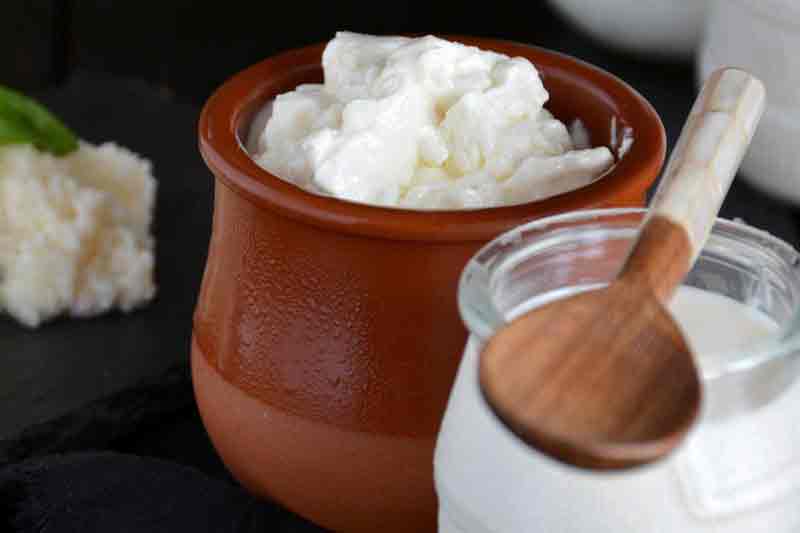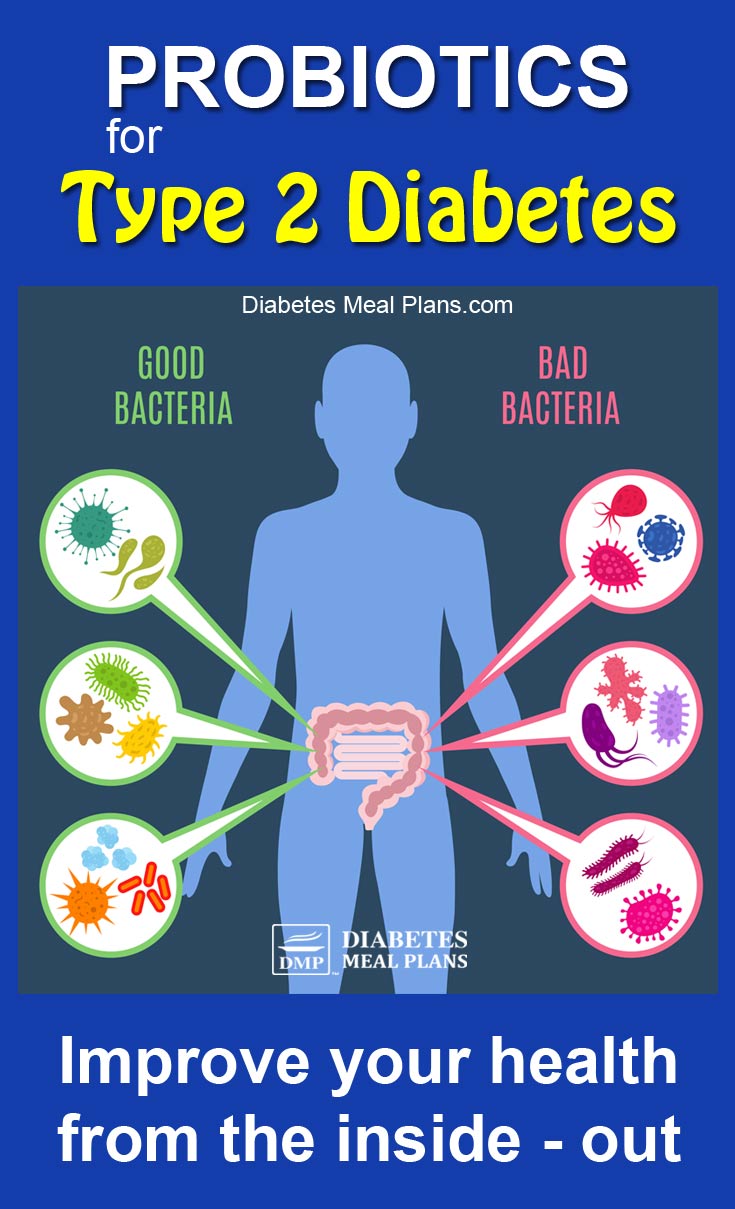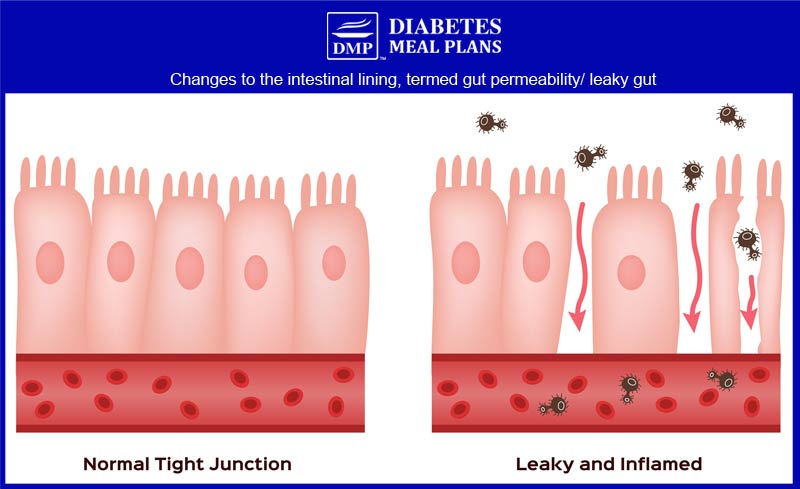Probiotics are beneficial bacteria that happen to be great for diabetes and prediabetes management!
They can assist with better blood sugar and A1c control, aid digestion, boost immunity and even boost your heart health.

Let’s explore more about probiotics and how you can make them a part of your dietary routine.
What are Probiotics?
To understand what probiotics are, we first need to take it one step backwards.
Inside your body, specifically your intestinal tract, there are thousands of tiny microorganisms living within you. This may sound creepy, but you’ll quickly pick up on how wonderful these little bacteria are.
These microorganisms are also commonly referred to as your “microbiota,” “microbiome,” “gut bacteria” or “gut flora.” But be warned, these microorganisms are not created equal in terms of your health.
Some bacteria are “good,” think of these as the friendly neighbors in your community. Other bacteria are “bad.” Those are the grouchy neighbors, or maybe the ones who cause the most trouble in your neighborhood.
Please pin, tweet or share; then keep reading.

There’s always going to be some of those “bad” neighbors living in your gut, but the idea is that you want more of those nice, friendly ones residing within you.
Probiotics are the beneficial microorganisms crawling around in your gut. These are the ones we want to encourage more of. And the good news is that you can directly ingest probiotics to help improve your gut bacteria profile.
How Do Probiotics Work?
Amazingly, for every one of our human genes, there are 100 more bacterial genes. Meaning, each microorganism has a unique combination of genes that make its own exclusive strain, and in turn has its own unique mechanisms and benefits.
Researchers with the Human Microbiome Project have been working to sequence, and understand, how each different probiotic strain impacts your body. This project started in 2008, but due to the complexity of the human microbiome there is still much to be learned about the gut bacteria.
With that being said, there are some well accepted theories as to how probiotics function within your body.
One proposed mechanism, is that probiotics help create a layer within your intestinal tract that prevents a condition called “leaky gut.”
Leaky gut is when tiny spaces have developed in between your intestinal cells, and through these small gaps, toxins (that should be en route to be eliminated in your feces) are now able to escape back into your bloodstream. These foreign toxins creates an inflammatory response within your body, which is going to negatively impact your health.

It’s also theorized that probiotics are able to produce vitamins that your body otherwise wouldn’t be able to produce. Vitamins produced by these bacteria include vitamin K as well as many B-complex vitamins (vitamin B12, folate, thiamine.)
Others have suggested probiotics interact with the immune cells also located in your gut, which boosts overall health and immune function.
Researchers are continually working to better define how probiotics work and as they uncover new scientific findings, it is becoming more apparent how extraordinary these organisms really are.
Research on Probiotics and Type 2 Diabetes
Without a doubt, your gut microbiome is important. And better yet, optimizing your gut microbiota may assist with your diabetes management.
For instance, a meta-analysis looking at 12 randomized controlled studies found that probiotic supplementation could lower fasting blood glucose by 11.27 mg/dl (0.6 mmol/l). This study also found a relationship between probiotics and decreased insulin resistance.
Similar results were observed when diabetic patients were instructed to take either a multistrain probiotic or a placebo for 8 weeks. The probiotics prevented a rise in fasting glucose, the results showing +28.8 mg/dl (1.6 mmol/l) for placebo and just +1.6 mg/dl (0.1 mmol/l) for probiotic group. Those taking probiotics also had much lower inflammation throughout their body.
This study emphasized the use of a 7-strain probiotic supplement, which is interesting because other research has shown that multistrain probiotics reduced fasting glucose more so than a single strain probiotic. This indicates that bacterial strains may play an important role in the benefits you reap, but we’ll get more into that a little bit further down.

Glycated hemoglobin, or HbA1c levels, have also been shown to improve after probiotic supplementation for 4-8 weeks.
In addition to helping with your blood sugar readings, probiotics may help regulate some of your cardiovascular measures of health as well. When researchers analyzed randomized clinical trials they found both systolic (top number) and diastolic (bottom number) blood pressure decreased in patients taking a probiotic supplement. They also found that total cholesterol and triglycerides reduced in those taking probiotics.
Other researchers have also shown that taking probiotics improves cholesterol levels, decreasing total cholesterol and LDL-cholesterol, while increasing HDL-cholesterol.
All and all, this adds up to some pretty great benefits for you:
- Lower fasting glucose
- Decreased insulin resistance
- Lower body-wide inflammation
- Lower A1c levels
- Improved cholesterol
- Lower blood pressure
Where are Probiotics Found?
Probiotics are found in fermented foods as well as supplements.
Fermented foods high in probiotics include:
- Yogurt
- Sauerkraut
- Kimchi
- Kefir
- Tempeh (fermented soybeans)
- Apple cider vinegar (with the mother)
Probiotics Supplements
Your first question may be, “how do I know if I need to take a probiotic supplement?”
The short answer is likely everyone does! It certainly can’t do any harm.
Most people consume minimal fermented foods in their regular diet, so the addition of a probiotic supplement is frequently a great idea. Anything from poor diet, to stress, to antibiotic usage can disrupt the healthy balance of gut bacteria found in your intestinal tract. So anytime you get a chance to boost the “good” guys, then go ahead, you’ll do your health a favor!
Plus, based on all the research presented above, if you’re prediabetic or type 2 diabetic then you definitely want to consider starting a probiotic supplement.
Probiotics come in many different strains. While there isn’t one strain that’s ‘optimal,’ you’re going to get the best result with a product that contains several different strains – a multi-strain probiotic. Look for a product with billions of bacteria present in a single serving, for example it might say “1 x 109 (one billion) live bacteria.” This ensures you are encouraging different types/strains of friendly bacteria to take up residency in your gut.
A good probiotic supplement should be sold in an opaque package, and will either be refrigerated or freeze dried. Leave refrigerated once opened.
Follow individualized product instructions for dosing information.
And, as always, remember to discuss dietary supplementation with your doctor. Be mindful that dietary supplements are not regulated by the FDA.






Pat
I agree that this is an excellent blog and website.
Just in this week that I have been nosing around I have learned to much and have had questions answered that I could not get from my medical team.
Oral Allergies: are you familiar with this? It prevents me from enjoying many raw vegetables. It starts with an itch in the throat that travels up the ear tubes and as it works its way down the esophagus the stomach starts to burn. The itchy throat and ears are quite annoying. Not to mention losing the benefit of eating raw vegetables. I have the same reaction with lettuce so I replace is with spinach. I can eat the veges if they are cooked. Blanching sometimes works and sometimes not.
Pat
Excellent website.
Are you familiar with Oral Allergies? I can only eat vegetables that have been cooked, or in some cases blanched. Since I am also allergic to lettuce, this really limits many recipes and options. Any suggestions?
Malorie: Dietitian (MS, RD, CLT)
Hi Pat,
The main way to manage symptoms with oral allergy symptom are to cook or heat fruits and vegetables, try canned fruits and vegetables, and peel fruits and vegetables. The severity is dependent on the individual along with what foods may cause symptoms.
SANDEEP YADAV
If we take a single strain only (not multiple) in preparation of a probiotic for a particular diseases ,can you suggest is it work or not ?@Dr. Emili
Emily - Dietitian (MS, RD)
A single strain is still beneficial, but not nearly as effective as a multistrain product. I would suggest finishing the bottle that you currently have and then when you purchase next time definitely look for that multistrain option!
Susan
Do you have any suggestions about which particular strains to look for? I get confused when I go to the pharmacy and see all the different options. Are some strains more effective for diabetics, for example, while others are more effective for travelers?
Emily - Dietitian (MS, RD)
Hi Susan, none of the studies I reviewed mentioned any specific strains. Two criteria for selecting a good product are: a) Look for something that is a multistrain product and b) something that also contains billions of bacteria present in a single serving.
Susan
Thanks, I will keep those two things in mind then. And thanks for all of the good information. DMP has helped me lower my A1C from 7.4 to 6.1.